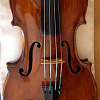We have thousands of human-written stories, discussions, interviews and reviews from today through the past 20+ years. Find them here:

March 2014
V.com weekend vote: Do you have more than one bow?
March 28, 2014 13:56In light of some new travel restrictions involving ivory, we polled readers a few weeks ago about whether or not their bow had any ivory. More than 50 percent said, "yes," so that would mean quite a lot of us traveling without our bows.
So here is my question for this week: Do you have more than one bow? Of course, there are many reasons to have more than one, beyond the ivory issue. Some are: having a nearly-unbreakable carbon fiber bow for playing in a classroom or playing outside; wanting a Baroque bow for that style of music; having bows that have different strengths for different pieces and techniques; or even just needing a spare for when one is being rehaired. I have a few bows, one being a carbon fiber bow. I'd like to get a Baroque bow, that's been on the wish list for a while!
How about you, do you have more than one bow?
Tweet
V.com weekend vote: Should you listen to recordings of the pieces you are playing?
March 21, 2014 11:28Should you listen to recordings of the pieces you are playing?
On one hand, listening to a recording of your piece could keep you from coming up with your own interpretation; you might be "aping" the version that you hear, rather than using your mind to come up with an original interpretation. It also might be a crutch for people who aren't learning to read music, to learn something "by ear" instead of learning to interpret the written page.
On the other hand, music is a lot like language; we learn its nuances from hearing it. A recording can help a person understand the style and lilt of a piece, things that are less obvious on the written page.
What are your thoughts on the matter? Please cast your vote and then feel free to discuss details and shades of gray in the comments section! (P.S. Thanks to Buri for the vote of the week idea! Please e-mail me if you have a suggestion for our weekly vote!)
Tweet
V.com weekend vote: Based on when your bows were made and what you know, do any of your bows likely have an ivory tip?
March 14, 2014 09:40According to the League of American Orchestras, some strict travel limits took effect on Feb. 25 regarding elephant ivory.
"According to the order, many instruments containing African elephant ivory will not be allowed into the U.S., even if a musician is simply returning to the U.S. with instruments in their personal possession, not intended for sale, " said the League.
I hate to say it, but this affects violinists, violists, cellists and bassists in a big way.
 The only way to get your bow that has an ivory tip, or your violin that has some ivory fittings, into the U.S. (or back into the U.S.) is to prove that you've owned it since before Feb. 26, 1976 (not only that it was made before then, but also that one person has owned it since before then), and to go through the process of obtaining a CITES musical instrument certificate, which you'll need to have in hand.
The only way to get your bow that has an ivory tip, or your violin that has some ivory fittings, into the U.S. (or back into the U.S.) is to prove that you've owned it since before Feb. 26, 1976 (not only that it was made before then, but also that one person has owned it since before then), and to go through the process of obtaining a CITES musical instrument certificate, which you'll need to have in hand.
As the League states, "A great many musical instruments containing African elephant ivory, while legally manufactured and acquired, would have been purchased after 1976, and will now be completely prohibited from entering into the U.S. Still others that have not been sold since 1976 may be missing key documentation. "
Personally speaking, one of my bows was made in the 1920s, and the other is a carbon fiber bow. I'm pretty sure that the carbon fiber bow has no ivory, but the other? I don't have any ivory fittings in terms of my pegs or tailpiece, or the frog of my bow, but many do.
So here is my question for you: Based on when your bows were made and what you know, do any of your bows likely have an ivory tip?
Tweet
More entries: February 2014











